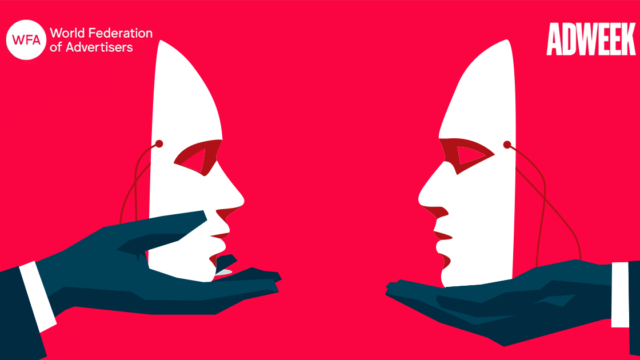Inspiration meets innovation at Brandweek, the ultimate marketing experience. Join industry luminaries, rising talent and strategic experts in Phoenix, Arizona this September 23–26 to assess challenges, develop solutions and create new pathways for growth. Register early to save.
At some point earlier this year, a Greenpeace planner (presumably) whipped together a brief.
- Get: Sun-kissed agency owners and network bosses.
- To: Stop working with fossil fuel companies.
- By: Showing that fossil fuel is killing the planet, and any agency assisting with that crime should be made to feel complicit.
- Budget: The cost of an afternoon’s kayak hire.
Most readers (whether they were in Cannes or not) will know what happened next: Protesters successfully put advertising’s relationship with oil and gas firmly in the spotlight. Based on their brief, this was a successful campaign.
But Greenpeace was dealing with a pretty unequivocal human truth here: Working with fossil fuel companies isn’t a grey area anymore.
For years, the argument advertising has upheld is that it can have greater influence from the inside by working with big oil to enact change. Their track record would suggest this isn’t happening. Just ahead of last year’s COP26, the U.N. said that plans by governments to extract fossil fuels by 2030 are incompatible with keeping global temperatures to safe levels.
This year’s IPCC report called out the explicit role of the marketing industry for the first time. Hundreds of prominent climate scientists put their names on an open letter asking agencies to stop working with fossil fuel companies and help cease spreading climate misinformation.
It’s not a complicated relationship, as some within our industry would like to believe. It’s an abusive one, founded on an unequal balance of power, where the one that writes the checks calls the shots. Cannes Lions should preempt the European Citizen’s Initiative (ECI) to ban fossil fuel advertising and sponsorship and introduce this ban at the festival.
Gustav Martner, the head of creative at Greenpeace Nordic who crashed the stage at Cannes to give back his Gold Lion for a car ad, was right to point out that more than 300 Lions have been handed out to work encouraging more air travel and cars with combustion engines since the Paris Agreement was signed in 2015. This is arguably where the shades of grey start to emerge.
We should question whether getting Australians to race the new Golf GTI is conducive to a fuel-efficient driving style. That feels a pretty dark carbon grey. But there’s much to applaud in Ford’s attempts to challenge online trolls with their Very Gay Raptor, even if the model in question is a performance-orientated SUV.
A less accurate generalization in Greenpeace’s press release was in declaring that the entire advertising industry is acting like everything is fine. At around the same time Gustav’s kayaks were storming the Croisette, a group of activists, innovators and agency leaders were at Goals House building plans for how brands can drive behavior change among consumers toward progress on the sustainable development goals. It was one of many similar boot camps running during the week among a growing group of practitioners that understand bold actions will speak far louder than our words ever could.
And looking at some of the entries in the Sustainable Development Goals and Business Transformation categories at Cannes Lions shows that our industry has the creativity to be a climate force for good. Piñatex from Dole is helping reuse the waste from millions of pineapples grown in the Philippines that would otherwise release significant methane emissions.
Cannes Lions Marketer of the Year AB InBev gave us Michelob Ultra’s Contract for Change and Budweiser’s Energy Collective, which both leveraged their business’ scale, not with consumers but with their supply chain and customers. Michelob Ultra helped farmers shift to organic production through support, training and a guarantee to buy the organic produce at a fair price. Budweiser used the scale of their commitment to provide renewable electricity at a market-beating price for thousands of bars and pubs currently powered by fossil fuels.
Each of these demonstrates creativity’s influence being felt upstream on sizable, sustainable programs. They are multiplying the impact of a business purpose rather than improving the storytelling of a brand purpose.
Going forward this might mean evolving business models, driving research and development or even changing laws. But these activities still rely on using advertising’s enduring skill set to make things easier to understand, easier to enjoy or easier to take part in.
Partnering with those on the frontline of change, like Greenpeace, will get us to more of these initiatives. So let’s hope festivals, awards and agencies take heed of this year’s brief and do the right thing by severing their ties with the fossil fuel industry. But let’s also hope that Greenpeace returns next year with a brief that recognizes the unique influence our industry can have on genuinely being part of the solution.
- Get: Sun-kissed agency owners and network bosses.
- To: Start working with companies capable of mitigating and reversing climate change.
- By: Leveraging the creative capital at their disposal to multiply their client’s positive impact against the climate emergency.










